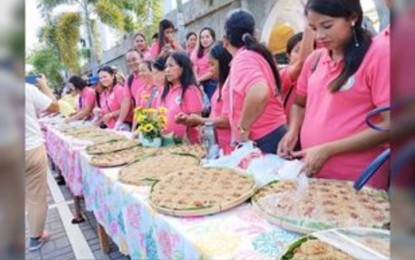
KANKANEN FESTIVAL. Some of the 511 bilao of kankanen (native rice cakes) before these were distributed to the residents and attendees of the Kankanen Festival 2023 in Asingan town, Pangasinan on Friday (June 9, 2023). A total of 2,044 kilograms of glutinous rice were used for the festival that aims to celebrate the livelihood of the people and promote their products. (Photo by Hilda Martin Austria)
ASINGAN, Pangasinan– Some 2,044 kilograms of native rice cakes were served and eaten by the residents and attendees of the Kankanen (native rice cake) Festival 2023 on Friday.
Mayor Carlos Lopez Jr. said the number of bilao (winnowing basket) of produced native rice cakes in this year’s festival doubled to 511 from 216 last year.
“Although we have other varieties of kankanen (native rice cakes), we focused on “inkiwar” as it symbolizes the unity of the people,” he said in an interview.
Inkiwar is made of sugar, coconut or carabao milk, and glutinous rice combined through the process of continuous manual mixing or stirring to achieve a sweet yet tasty native rice cake. It is usually topped with latik or caramelized coconut milk or cheese or nuts for the modern versions.
He said the kankanen were prepared by the barangay officials, schools, national government agencies, non-government organizations, farmers’ associations, and senior citizens associations.
Lopez said the festival is their thanksgiving for the abundance of harvest in their town and recognition of the hard work of the farmers and other agricultural workers as well as promoting the kankanen products known to be from the town.
Susan Mamalio, a resident of the town and a kankanen maker, said she was grateful for the festival that promotes their livelihood products.
“I am very happy that we have this festival. I have learned to make inkiwar from my grandmother and we continue to do it until now. Although the process is painstaking, we earn from it,” she said.
Aiming for Guinness World Records
Lopez said despite the unsuccessful attempt to be part of the Guinness Book of World Records, they will continue to improve and find ways to finally put the town’s name as a record holder.
“It did not happen this year but we will try again next year,” he said.
Asingan tourism officer Michael Soliven said their attempt to apply to the Guinness Book of World Records was unsuccessful due to budgetary constraints.
The town wrote to the Guinness Book of World Records in their supposed attempt to be the record holder for the longest-lined native rice cake or the most number of bilao with native rice cake.
Kankanen Festival was started in 2011 by the Department of Education. It was adopted by the local government unit as the town’s very own festivity in 2019.
The annual celebration was stopped due to the pandemic but resumed last year.
The festival runs from June 5 to 10 and the highlight was the feasting of the native rice cakes by all the people.
There were also street dancing competitions, medical mission, skateboard competitions, raffle, beauty pageant, basketball exhibition game, and the 1st Bornok Mangosong Enduro Race challenge, among others.
Asingan information officer Romel Aguilar said the town also promotes their municipal plaza and the dairy farm products from the Bantog Samahang Nayon, a group known for their fresh carabao milk products.
The municipal government is also planning to put up a museum for former President Fidel V. Ramos, who is a native of Asingan, and also a fishing park for added attraction here. (PNA)
